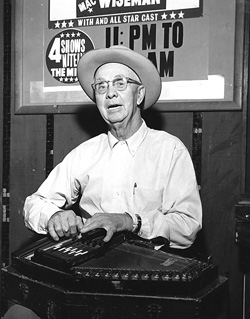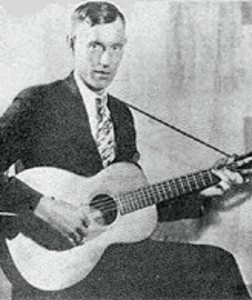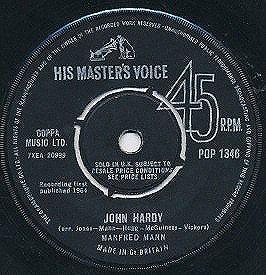
William Smith Monroe was an American mandolinist, singer, and songwriter, who created the bluegrass music genre. Because of this, he is often called the "Father of Bluegrass".

James Corbitt Morris, known professionally as Jimmy Driftwood or Jimmie Driftwood, was an American folk music songwriter and musician, most famous for his songs "The Battle of New Orleans" and "Tennessee Stud". Driftwood wrote more than 6,000 folk songs, of which more than 300 were recorded by various musicians.

The Incredible String Band were a British psychedelic folk band formed by Clive Palmer, Robin Williamson and Mike Heron in Edinburgh in 1966. The band built a considerable following, especially in the British counterculture, notably with their albums The 5000 Spirits or the Layers of the Onion, The Hangman's Beautiful Daughter, and Wee Tam and the Big Huge. They became pioneers in psychedelic folk and, through integrating a wide variety of traditional music forms and instruments, in the development of world music.

Moran Lee "Dock" Boggs was an American old-time singer, songwriter and banjo player. His style of banjo playing, as well as his singing, is considered a unique combination of Appalachian folk music and African-American blues. Contemporary folk musicians and performers consider him a seminal figure, at least in part because of the appearance of two of his recordings from the 1920s, "Sugar Baby" and "Country Blues", on Harry Smith's 1952 collection Anthology of American Folk Music. Boggs was first recorded in 1927 and again in 1929, although he worked primarily as a coal miner for most of his life.
"Misirlou" is a folk song from the Eastern Mediterranean region. The original author of the song is not known, but Arabic, Greek, and Jewish musicians were playing it by the 1920s. The earliest known recording of the song is a 1927 Greek rebetiko/tsifteteli composition. There are also Arabic belly dancing, Albanian, Armenian, Serbian, Persian, Indian and Turkish versions of the song. This song was popular from the 1920s onwards in the Arab American, Armenian American and Greek American communities who settled in the United States.
Here Northumbria is defined as Northumberland, the northernmost county of England, and County Durham. According to 'World Music: The Rough Guide', "nowhere is the English living tradition more in evidence than the border lands of Northumbria, the one part of England to rival the counties of the west of Ireland for a rich unbroken tradition. The region is particularly noted for its tradition of border ballads, the Northumbrian smallpipes and also a strong fiddle tradition in the region that was already well established in the 1690s. Northumbrian music is characterised by considerable influence from other regions, particularly southern Scotland and other parts of the north of England, as well as Irish immigrants.

Ernest Van "Pop" Stoneman was an American musician, ranked among the prominent recording artists of country music's first commercial decade.

Tommy Johnson was an American Delta blues musician who recorded in the late 1920s and was known for his eerie falsetto voice and intricate guitar playing. He was unrelated to the blues musician Robert Johnson.

Appalachian music is the music of the region of Appalachia in the Eastern United States. Traditional Appalachian music is derived from various influences, including the ballads, hymns and fiddle music of the British Isles, the African music and blues of early African Americans, and to a lesser extent the music of Continental Europe.

Ervin Drake was an American songwriter whose works include such American Songbook standards as "I Believe" and "It Was a Very Good Year". He wrote in a variety of styles and his work has been recorded by musicians around the world. In 1983, he was inducted into the Songwriters Hall of Fame.

Frank Hutchison was an American early country blues and Piedmont blues musician and songwriter. Okeh Records promotional materials referred to him as “The Pride of West Virginia,” and he is thought to be the first non-African American musician to record in the country blues idiom. Hutchison was best known as a slide guitar player, where he held the guitar in his lap and used a pen knife as a slide.
Henry Franklin "Dick" Justice was an American blues and folk musician, who hailed from West Virginia, United States.
James Edward "Ed" Haley was a blind professional American musician and composer best known for his fiddle playing.

"John Hardy" is a traditional American folk song based on the life of a railroad worker living in McDowell County, West Virginia in the Spring of 1893. The historical John Hardy is believed to have gotten into a drunken dispute during a craps game held near Keystone, and subsequently killed a man named Thomas Drews. Hardy was found guilty of murder in the first degree, and was hanged on January 19, 1894, with 3,000 people allegedly in attendance. Hardy is believed to have made peace with the Lord the morning before his death by being baptized in a river.
"Salty Dog Blues" is a folk song from the early 1900s. Musicians have recorded it in a number of styles, including blues, jazz, country music, bluegrass. Papa Charlie Jackson recorded an adaptation for Paramount and Broadway in 1924. According to Jas Obrecht, "Old-time New Orleans musicians from Buddy Bolden’s era recalled hearing far filthier versions of 'Salty Dog Blues' long before Papa Charlie’s recording." Similar versions were recorded by Mississippi John Hurt and Lead Belly.

"Dust My Broom" is a blues song originally recorded as "I Believe I'll Dust My Broom" by American blues artist Robert Johnson in 1936. It is a solo performance in the Delta blues-style with Johnson's vocal accompanied by his acoustic guitar. As with many of his songs, it is based on earlier blues songs, the earliest of which has been identified as "I Believe I'll Make a Change", recorded by the Sparks brothers as "Pinetop and Lindberg" in 1932. Johnson's guitar work features an early use of a boogie rhythm pattern, which is seen as a major innovation, as well as a repeating triplets figure.
"One Way Out" is a blues song that was recorded in the early 1960s by both Sonny Boy Williamson II and Elmore James. A reworking of the song by G. L. Crockett, titled "It's a Man Down Here", appeared on the Billboard record charts in 1965. In 1971, the Allman Brothers Band recorded an updated live version of the song, which was included on their popular Eat a Peach album (1972).
"Orange Blossom Special" is a fiddle tune about the luxury passenger train of the same name. The song was written by Ervin T. Rouse (1917–1981) in 1938 and was first recorded by Rouse and his brother Gordon in 1939. Often called simply "The Special" or "OBS", the song is commonly referred to as "the fiddle player's national anthem".
The McGee Brothers were an American old-time performing duo of brothers Sam McGee and Kirk McGee. Sam typically played guitar and Kirk usually played banjo or fiddle, although they were both proficient in multiple string instruments. The McGee Brothers were one of the most enduring acts on the Grand Ole Opry during the show's first fifty years. They made their initial appearance on the Opry in 1926 and the following year joined Uncle Dave Macon's band, the Fruit Jar Drinkers. In the 1930s, the McGees teamed up with early Opry fiddler Arthur Smith to form a string band known as the "Dixieliners," and in the 1940s they played and toured with Bill Monroe and His Bluegrass Boys and several other notable acts.

"O Death", also known as "O, Death", "Oh Death" and "Conversations with Death", is a traditional Appalachian folk song, listed as number 4933 in the Roud Folk Song Index. The song is generally attributed to the musician and Baptist preacher Lloyd Chandler, but it was likely taken or adapted from folk songs already existing in the region.











